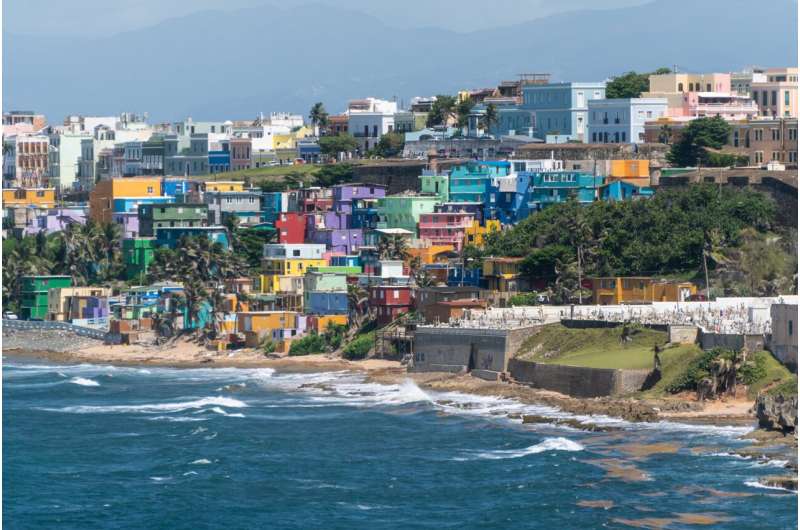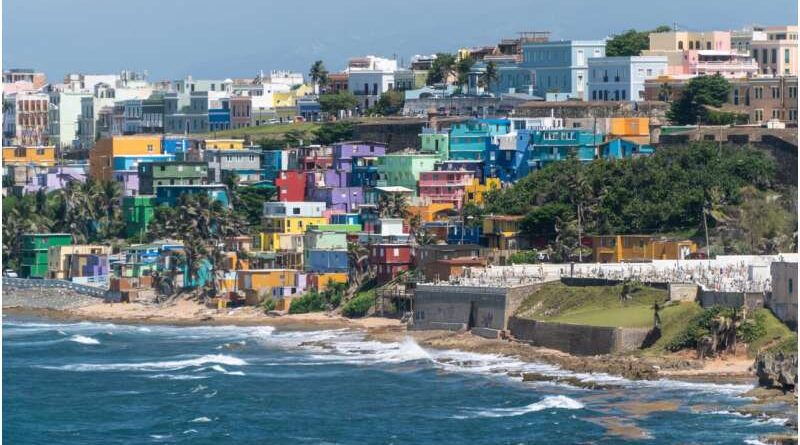‘Often forgotten’: How US hurricane relief and health care policies are leaving Puerto Rico

Credit: Unsplash/CC0 Public Domain
In just a few years, the people of Puerto Rico endured a series of powerful storms—including Hurricanes Irma, Maria, and Fiona—and faced hundreds of earthquakes. Then, the COVID-19 pandemic hit, straining the island’s health services to the point where they were devastated.
“Puerto Rico has had many disasters, which are increasing in recent years. It has been a process of solving health problems, to say the least,” said Anna-Michelle McSorley, a postdoctoral fellow at the NYU School of Global Public Health and the NYU Center on Anti-Racism, Social Justice and Public Health.
In an article published in American Journal of Public HealthMcSorley and his colleagues explain how federal policies treat the “often forgotten US territory of Puerto Rico” differently than the other 50 states. As a result, these policies exacerbate existing disparities in good health in the field.
The researchers focused on three key policy gaps that put the health of Puerto Ricans at risk: an uneven response to disasters from the Federal Emergency Management Agency (FEMA), an imbalance in the funding of Medicaid, and Puerto Rico’s limited political power.
“Our lens needs to look up—which is a lot of what we do in public life—to say, ‘This is where the policy is failing. This is where it’s creating a barrier, and ultimately that’s what leads to the results we’re seeing. see,” said McSorley, the study’s lead author, who will join the faculty at the University of Connecticut this fall.
NYU News spoke with McSorley about the unique public health challenges facing Puerto Rico and how US policies are contributing to the divide.
How has America’s response to natural disasters hindered Puerto Rico’s recovery?
After Hurricane Maria in 2017, FEMA provided funding to the area. But a 2019 study looked at how much aid was sent in the following days, and Puerto Rico received far less than Texas and Florida, which were hit by major hurricanes that same year.
Additionally, the federal government conducted an internal investigation and found that FEMA misappropriated $257 million in Puerto Rico after Hurricane Maria.
But if we dig deeper to look at the policies that apply to Puerto Rico more clearly, we can also look at the Merchant Marine Act of 1920, a federal law that regulates how goods are transported by sea and requires Puerto Rico to be bring equipment to the US. ships.
As a territory, Puerto Rico cannot communicate independently with other countries, in order to restrict the flow of resources. It also increases the cost of almost every product you can think of, especially food, because of tariffs.
That policy creates an additional level of burden. Even if other governments tried to find a way to provide support after a natural disaster, it would need to happen the way the US did during Hurricane Maria. lead to many other natural disasters within the contiguous United States.
How do government regulations affect health workers in Puerto Rico?
Puerto Rico has a shortage of health care providers, primary care and specialists. It’s a multi-layered problem, but one contributing factor is that Medicaid reimbursement rates are lower than state rates.
About half of the population of Puerto Rico depends on Medicaid or the Children’s Health Insurance Program, so the reimbursement rate is very important for supporting the health system.
Unlike states where Medicaid operates as an entitlement program, Puerto Rico’s Medicaid program is funded by grants that used to be a fixed annual amount that only covered 55 percent of expenses.
Over the years, especially as hurricanes and COVID-19 hit, those percentages have varied. Congress has passed legislation to increase the level of remittances. But the increases that were used in Puerto Rico to bring in more money are about to expire, and the proposed legislation permanently guarantees the ability to gradually increase the Medicaid reimbursement percentage—with the goal of reaching to the dollar. -the dollar game-hasn’t gone ahead.
This leaves Puerto Rico unable to pay its providers at a competitive rate, and the reality is that there are higher paying jobs within the 50 states with higher reimbursement rates.
Regarding the training of doctors in Puerto Rico, there are good medical schools on the island, but there are not enough residences to meet the demand for people to stay. Many medical students have to seek residency elsewhere—that’s where we end up losing many health care providers.
Once they leave, they are enlightened to the fact that they can be paid more and their living conditions improve. Many want to return to Puerto Rico, but options are limited. If you do get a position, you’re probably in an underfunded infrastructure that can’t be reimbursed at the rate it needs, with high demand from patients who wait months for appointments.
That energy is challenging and can lead to burnout, especially after a pandemic.
How does political power enter into these public health issues?
Puerto Ricans are politically active. Election day is a holiday—there are parades in the streets, flags, face paint, and everyone actively participates in the political process. There is a very strong tradition for the Puerto Rican voice to be heard.
Although there is the ability to participate with such power in the implementation of territorial laws-Puerto Rico can vote for its own governor-it is still not an independent nation. In American elections, they cannot vote for the president, and they do not have senators with the power to vote. They elect a Puerto Rico Resident Commissioner, a member of Congress who is part of the House, but this representative does not have full voting power.
This makes it very difficult when you’re talking about things like FEMA funds being misused, or Medicaid prevention grants, which are congressional decisions. When you have a region that has the ability to make local decisions but has no voting power at the federal level, it creates strong restrictions and a very unfair system.
Do you think Americans’ feelings about Puerto Rico play into this?
A survey was conducted among Americans shortly after Hurricane Maria. It found that nearly half did not know that Puerto Ricans are fellow US citizens—citizens who pay federal taxes, obey federal laws, and serve in the military.
From a political point of view, if you say, “Hey, we need to send resources to this area,” it’s considered foreign. But that can complicate matters because people may think, “Let’s focus on distributing resources domestically”—especially when we’re dealing with simultaneous disasters in Texas. and Florida.
Among other domestic challenges, if you have the feeling that the field is not a domestic area, it makes people not like to plant resources.
What can be done to reduce health inequalities? Should Puerto Rico’s position as a destination change?
The question of status is very hot – whether Puerto Rico should remain a territory, or if it should become a state or become independent. This question—which can certainly tear families apart!—is often debated around dinner tables.
I’m Nuyorican, born in New York and raised between the two places. In terms of statehood or independence, I believe the decision should be made by the Puerto Rican people—it should be for them to decide what is the best way forward.
But I also think that part of the solution depends on the Latino vote here in the 50 states, since Latinos are a large part of the population of the United States and growing. If we were to come together and see the issues facing Puerto Rico as issues of unity across the Latino community, that would be a great way to move the needle on behalf of people who will not make it to the polls. theirs are counted.
Additional information:
Anna-Michelle Marie McSorley et al, United States Federal Policies Addressing Health Inequalities and Health Care in Puerto Rico, American Journal of Public Health (2024). DOI: 10.2105/AJPH.2024.307585
Offered by New York University
Excerpt: ‘I often forget’: How US hurricane aid and health care policies are leaving Puerto Rico (2024, August 22) Retrieved August 23, 2024 from https://medicalxpress.com/news/2024 -08-forgotten-hurricane-relief-health-policy.html
This document is subject to copyright. Except for any legitimate activity for the purpose of private study or research, no part may be reproduced without written permission. Content is provided for informational purposes only.
#forgotten #hurricane #relief #health #care #policies #leaving #Puerto #Rico
